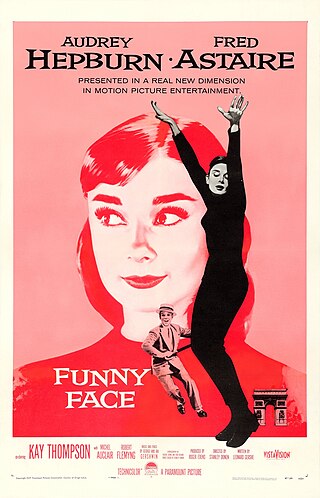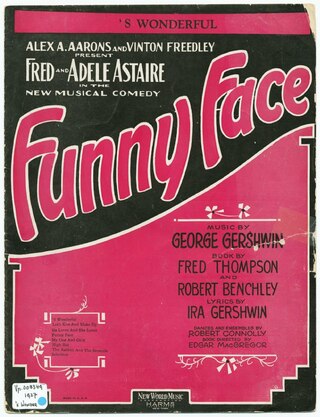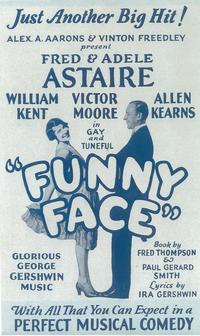
Funny Face is a 1957 American musical romantic comedy film directed by Stanley Donen and written by Leonard Gershe, containing assorted songs by George and Ira Gershwin. Although having the same title as the 1927 Broadway musical Funny Face by the Gershwin brothers, and featuring the same male star, the plot is completely different and only four of the songs from the stage musical are included. Alongside Astaire, the film stars Audrey Hepburn and Kay Thompson.
Roger Edens was a Hollywood composer, arranger and associate producer, and is considered one of the major creative figures in Arthur Freed's musical film production unit at Metro-Goldwyn-Mayer during the "golden era of Hollywood".

Shall We Dance is a 1937 American musical comedy film directed by Mark Sandrich. It is the seventh of the ten Fred Astaire-Ginger Rogers films. The story follows an American ballet dancer (Astaire) who falls in love with a tap dancer (Rogers); the tabloid press concocts a story of their marriage, after which life imitates art. George Gershwin wrote the symphonic underscore and Ira Gershwin the lyrics, for their second Hollywood musical.
"Embraceable You" is a jazz standard song with music by George Gershwin and lyrics by Ira Gershwin. The song was written in 1928 for an unpublished operetta named East Is West. It was published in 1930 and included in that year's Broadway musical Girl Crazy, performed by Ginger Rogers in a song and dance routine choreographed by Fred Astaire.
"Let's Call the Whole Thing Off" is a song written by George Gershwin and Ira Gershwin for the 1937 film Shall We Dance, where it was introduced by Fred Astaire and Ginger Rogers as part of a celebrated dance duet on roller skates. The sheet music has the tempo marking of "Brightly". The song was ranked No. 34 on AFI's 100 Years...100 Songs.

"'S Wonderful" is a 1927 popular song composed by George Gershwin, with lyrics written by Ira Gershwin. It was introduced in the Broadway musical Funny Face (1927) by Adele Astaire and Allen Kearns.
Leonard Gershe was an American playwright, screenwriter, and lyricist.
"Funny Face" is a 1927 song composed by George Gershwin, with lyrics by Ira Gershwin.
"(I've Got) Beginner's Luck" is a song composed by George Gershwin, with lyrics by Ira Gershwin, written for the 1937 film Shall We Dance, it was introduced by Fred Astaire. It is a brief comic tap solo with cane where Astaire's rehearsing to a record of the number is cut short when the record gets stuck. Astaire's commercial recording for Brunswick was very popular in 1937.
"He Loves and She Loves" is a 1927 song composed by George Gershwin, with lyrics written by Ira Gershwin.

Funny Face is a 1927 musical composed by George Gershwin, with lyrics by Ira Gershwin, and book by Fred Thompson and Paul Gerard Smith. When it opened on Broadway on November 22, 1927, as the first show performed in the newly built Alvin Theatre, it starred Fred Astaire and his sister Adele Astaire. It was in this show that Astaire first danced in evening clothes and a top hat.
"Strike Up the Band" is a 1927 song composed by George Gershwin, with lyrics by Ira Gershwin with the collaboration of Millie Raush. It was written for the 1927 musical Strike Up the Band, where it formed part of a satire on war and militaristic music. Although the musical was not successful, the instrumental version of the song, titled the "March from Strike Up the Band", has become quite well known. The song was also used in the Judy Garland-Mickey Rooney 1940 film Strike Up the Band.

Girl Crazy is a 1943 American musical film starring Judy Garland and Mickey Rooney. Produced by the Freed Unit of Metro-Goldwyn-Mayer, it is based on the stage musical Girl Crazy – which was written by Guy Bolton and Jack McGowan, with music and lyrics by George and Ira Gershwin. It was the last of Garland and Rooney's nine movies as co-stars, the pair appearing only once more together on film, as guest stars in 1948's Words and Music.

Mel Tormé Sings Fred Astaire is a 1956 album by Mel Tormé, recorded in tribute to Fred Astaire. This was Tormé's second recording with Marty Paich and his Dek-Tette.

Warm and Willing is the tenth studio album by American pop singer Andy Williams and was released in 1962 by Columbia Records. Allmusic's William Ruhlmann explained that Williams and producer Robert Mersey "followed the Sinatra concept-album formula of creating a consistent mood, in this case a romantic one, and picking material mostly from the Great American Songbook of compositions written for Broadway musicals in the 1920s and 1930s by the likes of George and Ira Gershwin, then giving them slow, string-filled arrangements over which Williams could croon in his breathy, intimate tenor voice."

Michael & George: Feinstein Sings Gershwin is a 1998 album by American vocalist Michael Feinstein of songs composed by George Gershwin. It was Feinstein's third album of Gershwin's music, following Pure Gershwin (1987) and Nice Work If You Can Get It: Songs by the Gershwins (1996).

Pure Gershwin is a 1987 album by American vocalist Michael Feinstein of songs composed by George Gershwin. This was Feinstein's debut studio recording.

Nice Work If You Can Get It: Songs by the Gershwins is a 1996 album by American vocalist Michael Feinstein of songs composed by George Gershwin. It was Feinstein's second album of Gershwin's music, following Pure Gershwin (1987) and preceding Michael & George: Feinstein Sings Gershwin (1998).

Garland at the Grove is the debut live album by Judy Garland. It was released in mono on February 2, 1959 and in stereo on February 16, 1959 by Capitol Records, and accompanied by Freddy Martin and his orchestra. The album was recorded at the Cocoanut Grove nightclub at the Ambassador Hotel in Los Angeles.











